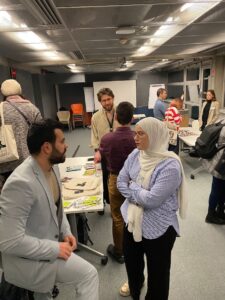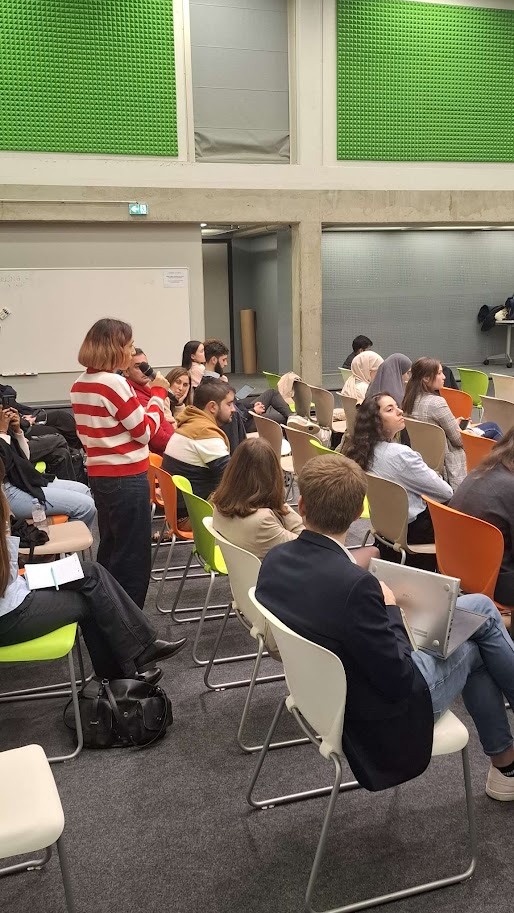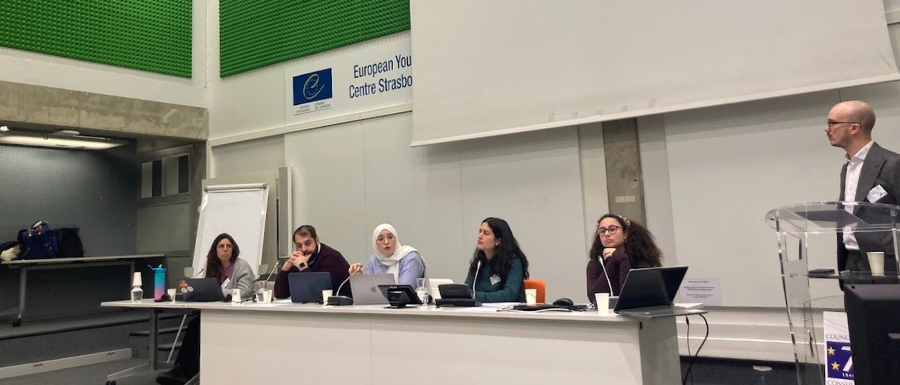On February 12, the European Youth Centre in Strasbourg (France) hosted the final conference of the 2030 Youth Vision Project—Shaping the Future Through Youth Participation. The event brought together project partners including Association for Developing Voluntary Work Novo Mesto (Slovenia), Municipality of Catadau (Spain), Municipality of Lousada (Portugal), and Digital World Foundation (Italy), alongside several French and Belgian organisations, including Gescod, FEMYSO, Youth ID, Jeunes Européens Strasbourg, Youth Express Network, and AMSED.
The conference opened with a presentation by Aladdin Alrifai, Project Manager at ALDA, who expressed his pleasure in collaborating on this initiative. This event marked the culmination of an ambitious project designed to encourage young people to engage in local politics within a sustainable development framework.
Following this, Andrea Michelini, Project Manager at ALDA, introduced the organisation’s mission and vision. He highlighted ALDA’s strong collaboration with local associations and showcased three key youth-oriented projects: The Future We Want Project, YouthSocial Act Project, and EYE 2025, which will take place at the European Parliament in Strasbourg this June.
Before the roundtable began, Alexandre Godonaise, President of Jeunes Européens Strasbourg, took the floor. Alexandre introduced the association, outlined its advocacy activities, and presented the flagship programme “Europe par les Jeunes”, a European educational programme in Strasbourg and the surrounding region – a continuous exchange of knowledge among young people, for young people.
The roundtable, titled “Active Youth Participation”, began with Aladdin introducing the topic of the conference, discussing the challenges, best practices, and future projects in youth participation. This was followed by the moderation of Alexandre Météreau, Policy and Campaign Officer at ALDA, who introduced the topic and the different speakers, including Hania Chalal, President at FEMYSO, Ekrem Sahin, Secretary General of Youth Express Network, Charlotte Gong, engaged volunteer at AMSED, Marion Clasquin, International Mobility Coordinator at GESCOD, and Anissa Ben Rahal, International Project Officer at YouthID. The conversation explored the role of young people in shaping a rapidly changing world and how their participation in governance can drive meaningful change.
Marion Clasquin from GESCOD discussed how the international volunteering programmes, such as VSI, have evolved. Previously known as Volunteers for Progress, these programmes have now become professional pathways, signifying a shift towards long-term impact. Alexandre Météreau then steered the conversation towards public policy, asking how governance structures can become more representative of young people. Hania Chalal, speaking on behalf of FEMYSO, emphasised the importance of inclusion, particularly in ensuring that marginalised communities have a voice. She said,
“True democracy must be resilient and inclusive, incorporating diverse perspectives rather than token representation.”
Charlotte Gong, from AMSED, spoke about how her organisation empowers young people by providing opportunities for mobility and digital citizenship projects such as the European Solidarity Corps (ESC). Such programmes enable young participants to gain professional skills, work in diverse fields, and create strong cross-border connections. AMSED also supports young people from disadvantaged backgrounds by equipping them with media literacy skills, encouraging them to become digital journalists within their own communities.
Ekrem Sahin from Youth Express Network explained the organisation’s mission, which has spanned over three decades. YEN fosters youth inclusion and representation through a network of 29 member organisations across 18 European countries. Their work is rooted in the belief that young people should not remain passive spectators but active changemakers. He gave an example of how YEN provides spaces for young people from disadvantaged backgrounds to discuss European citizenship, particularly around elections.
Anissa Ben Rahal from Youth ID highlighted how European projects, especially those under Erasmus+ and ESC, have gained prominence due to increased EU funding and social media outreach. However, in France, the impact remains limited, and there is a need to engage young people who are typically excluded from these opportunities. Programmes such as Second Chance Schools aim to bridge this gap, fostering intercultural understanding and combating prejudice.
The discussion also explored the barriers preventing young people from engaging in civic participation, including the lack of accessible information about opportunities, the marginalisation of certain communities, and institutional reluctance to give young people a seat at the table. As the discussion drew to a close, Alexandre Météreau asked how organisations could better support youth engagement. The speakers emphasised the need to diversify volunteer roles beyond project management, incorporating technical fields such as craftsmanship, and highlighting that youth engagement is not merely about future potential, but about present impact.
Young people are already shaping the world. The challenge is to ensure that all young voices, not just those with access to resources, are heard.
The second part of the conference featured representatives from partner organisations and a participant who shared their experiences and perspectives on local transformation through youth-led initiatives. Marc Caballero Císcar, who works on local development strategies for the Municipality of Catadau (Spain), explained that the project focuses on co-producing local policies to achieve the Sustainable Development Goals (SDGs) and actively involving young people from small villages. While engaging youth in smaller communities may seem easier, there are several challenges to overcome. Many young people in the village lacked awareness of these topics and were unfamiliar with how to write policies or engage in decision-making. As a result, raising awareness became an essential step.
Next, Beatriz Veiga, a student and participant from Lousada Municipality (Portugal), shared her perspective. Beatriz discussed how youth participation empowered her to help shape the future of her community. In her role in the local labs, she took part in activities such as research, information gathering, brainstorming, and identifying the strengths and opportunities within each local context. She highlighted the importance of teamwork and collaboration. Through her involvement, she felt that her voice was heard—something that is often missing in government decision-making, where young people are typically not listened to. For Beatriz, this project represented a significant shift, which gave her a renewed sense of hope.
To conclude this section, Sean Currie from the Advisory Council on Youth took the floor to highlight the role of young people in shaping the policies that affect them. He emphasised the importance of institutional support for youth participation and encouraged young participants to continue engaging beyond the project.
The conference concluded with a marketplace where different organisations had stands, and there were presentations of initiatives and opportunities led by young people, as well as innovative projects and inspiring practices. It also provided networking opportunities and the chance for collaborations between participants.






